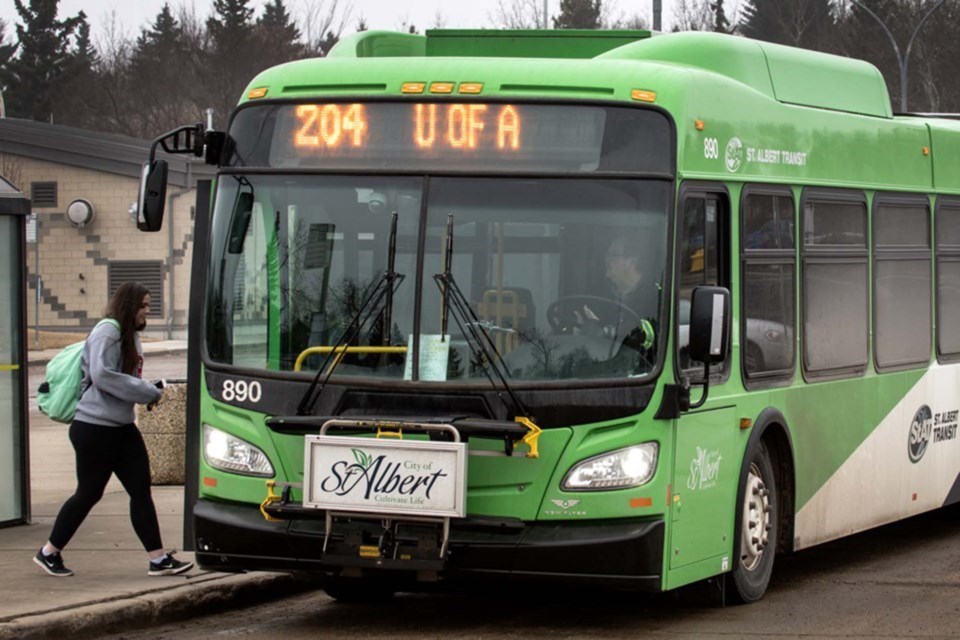City council will be debating the future of St. Albert's involvement in regional transit early next year after a notice of motion was submitted by Coun. Sheena Hughes on Dec. 6 that seeks to dissolve the Edmonton Metropolitan Transit Services Commission.
Hughes put forward the motion because of concerns around increasing costs to deliver transit through the commission.
The motion, if passed, would compel Coun. Wes Brodhead, St. Albert's representative for the Edmonton Metropolitan Transit Services Commission (EMTSC), to submit a motion at the EMTSC board level, and attempt to get signatures from at least three of the eight board members.
If the signatures are acquired, the motion to dissolve the EMTSC would then need to be delivered to every member of the board, the CEO of the EMTSC, and Municipal Affairs Minister Rebecca Schulz.
As previously reported by The Gazette, St. Albert's city councillors were "disappointed" and "frustrated" with unexpected additional costs associated with the regional transit system's first year of operations. For St. Albert specifically, participating in the regional transit network requires $1.45 million to be added to next year's transit budget, which previously stood at $11,977,400.
"We, as a municipality, are now expected to pay, in addition to our operating costs, in addition to handing over all the revenue that we receive, over $1.4 million in order to be part of a commission," Hughes said in an interview.
"This is not looking like it's likely to produce the results that were promised in 2020, and we need to reevaluate our presence in this commission, and if it should still continue," Hughes said. "Really, it shouldn't."
In a backgrounder prepared by city administration in advance of a council meeting on Nov. 22, the city's deputy solicitor Marta Caufield outlined St. Albert's two options to leave the EMTSC, which is currently set to begin operating on April 30, 2023.
The option Hughes' motion seeks to take is the cheaper of the two choices, although it's dependent on the agreement of representatives from other municipalities.
“[Coun. Brodhead] would be authorized to take steps to approach other directors, pass a notice of motion at the board level at the EMTSC, and then take steps to see if he could get three other directors to sign," Caufield said in the backgrounder.
However, prior to the motion reaching the commission board, the board could refer the issue to arbitration to see if a solution could be reached, the backgrounder says.
If the board decided not to refer the issue to arbitration, Caufield states in the backgrounder, the board could vote to dissolve the EMTSC.
"If dissolved, and depending on the date of the dissolution, [St. Albert] would be obligated to pay the 2023 member requisition, the city’s portion (34 per cent) of the EMTSC’s loan, up to $2,366,700, and any associated costs," the backgrounder says.
St. Albert's 2023 requisition is $9.3 million.
In an interview, Brodhead said he wasn't surprised Hughes' submitted the motion, adding that he felt her position on the EMTSC was clear throughout recent council debates on the subject.
"[Hughes] was unequivocal in her belief that the commission is not in the best interest of St. Albert," Brodhead said. "She's entitled to that opinion, and she's a councillor and she has every right to make motions. I'm also a councillor and entitled to my opinion, and I disagree with her."
"I believe that the concept of the regional transit commission is quite honestly the best path forward for the delivery of transit services in the region," he said. "Ultimately, the commission model saves money. It's more effective and it's certainly more efficient."
"Is there growing pains? Absolutely."
Mayor Cathy Heron was unavailable for an interview with The Gazette.
According to the backgrounder, St. Albert's other option to leave the EMTSC involves simply withdrawing from the commission. However, the EMTSC's governance bylaw requires 365 days notice be provided by a municipality; a proposed withdrawal date; and the municipality would also need to enter an agreement with the commission "to pay costs incurred by the EMTSC and remaining members resulting from the city’s withdrawal."
"If the city gave sufficient notice of its intention to withdraw prior to the end of 2022, the city would be obligated to pay the 2023 member requisition, the 2024 member requisition, any other costs identified in the agreement with the EMTSC, and associated costs," Caufield wrote in the backgrounder.
"The assumption that both 2023 and 2024 requisitions would have to be paid takes into account the time needed to give notice, how notice must be effected, and when the operating budget of the EMTSC is passed annually," Caufield told The Gazette in an email, noting the EMTSC approves its budget by late October.
Although the exact costs of withdrawing from the commission wouldn't be known until an agreement is made, Caufield said, the governance bylaw states they could include legal, accounting, and administrative expenses, and "costs of borrowing incurred during or attributable to the time of the member’s membership.”




